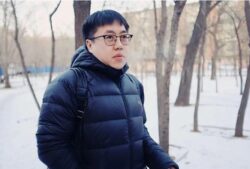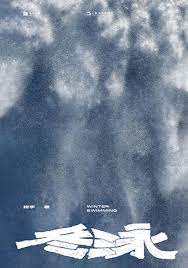December 2023: Ban Yu 班宇
 Born in 1986, Ban Yu has a bachelor’s degree in computer science from Northeastern University in his home city of Shenyang, Liaoning province. A rising literary star focused on short stories, Ban has published two critically acclaimed and popular anthologies, A Happy Excursion and Winter Swimming. His protagonists are working-class individuals—a factory worker, a gambler, a man who has lost his job—whose voices often go unheard as they go through life inevitably affected by the era. Ban Yu’s short stories have been published in a number of literary magazines, and he was named “Most Promising Newcomer” at the 2019 Chinese Literature Media Awards, as well as “New Writer of the Year” by GQ magazine.
Born in 1986, Ban Yu has a bachelor’s degree in computer science from Northeastern University in his home city of Shenyang, Liaoning province. A rising literary star focused on short stories, Ban has published two critically acclaimed and popular anthologies, A Happy Excursion and Winter Swimming. His protagonists are working-class individuals—a factory worker, a gambler, a man who has lost his job—whose voices often go unheard as they go through life inevitably affected by the era. Ban Yu’s short stories have been published in a number of literary magazines, and he was named “Most Promising Newcomer” at the 2019 Chinese Literature Media Awards, as well as “New Writer of the Year” by GQ magazine.
Bio from The World of Chinese
This month we're presenting a story by Ban Yu - 'Winter Swimming', and we're delighted that it's been translated by members of our Centre - Guo Huarui and Helen Lewis, with Chen Xiaonan, edited by Zhang Dongxiu. Thank you to them, and to the author, for allowing us to publish it! You can read the original Chinese here, and the translation here.
 There's another story, 'District Champ', in The World of Chinese, translated by Zhang Yuqing. As the author adds in a note to the translation, this was part of his earliest work, and it was at this time that he began to set his stories in the industrial districts of the Northeast in the 1990s. "At the time, the industrial age notions were fully integrated with traditional livelihoods, and change was constantly taking place—some inspiring, others bleak."
There's another story, 'District Champ', in The World of Chinese, translated by Zhang Yuqing. As the author adds in a note to the translation, this was part of his earliest work, and it was at this time that he began to set his stories in the industrial districts of the Northeast in the 1990s. "At the time, the industrial age notions were fully integrated with traditional livelihoods, and change was constantly taking place—some inspiring, others bleak."
There's also a fascinating conversation with Ban Yu, from 2020, conducted by Zhao Mengsha for Leap magazine:
For me, a work starts with a single sentiment that cannot be articulated. You need to try your best to describe it clearly through the form of the novel, rather than simply generalizing it into words like sorrow and pain, or joy and pleasure. A person can be happy and at the same time vexed. You may have a lot of inexplicable emotions in northeast China, and the dichotomy between a person’s happiness and unhappiness or between right and wrong does not hold here. I believe that all novels and artworks need to, at least for me, explore such an ambiguous space. Whether it be writing novels or making paintings, ultimately they need to be a reflection of a person’s selfhood. Different people say different things. And in your own works, you just cannot lie.
